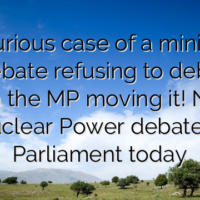RenewableUK is welcoming a new report commissioned by the Committee on Climate Change which shows the cost of offshore wind energy will drop dramatically by the end of the decade, with further significant cost reductions in the 2020s.
The study, “Approaches to cost reduction in offshore wind” by BVG Associates for the CCC, says there is strong evidence that offshore wind is already on track to drive down costs by a third, to reach its target of £100 per megawatt hour (MWh) by the end of the decade. This reduction will continue in the 2020s by improving the reliability of turbines and by increasing their capacity to 10MW or higher. The report estimates that this will cut offshore wind costs to £80/MWh by 2030. But to do this, the Government must set out a clear vision of how much capacity it wants installed and by when, allocating financial support accordingly with a rolling 5-year horizon to secure long-term confidence.
The study is quoted in the CCC’s main report, also published today, “Meeting Carbon Budgets – Progress in Reducing the UK’s emissions”. This report also examines the Government’s decision to withdraw financial support for onshore wind, even though it is one of the most cost-effective forms of clean energy at £80/MWh. Highlighting that cost-effectiveness, the CCC notes that this means that onshore wind should be considered subsidy free from around 2020. The CCC calls for the Government to be “transparent over the cost to consumers if low-cost options like onshore wind are constrained”.
RenewableUK’s Director of Policy Dr Gordon Edge said: “The clear message from the Committee on Climate Change is that if we want to keep all our fuel bills as low as possible, the Government shouldn’t be trying its damnedest to kill off the onshore wind industry. The CCC says the current low cost of onshore wind at £80/MWh shows it can be subsidy-free by 2020, matching the cost of new gas. Why on earth would any Government want to stop that happening?
And if Ministers are serious about working with us to make offshore wind one of the most cost effective sources of energy in the next decade, they need to spell out how much they want to see built and set out a clear timetable for this. Visibility is the key word here – especially on budgets and the availability of Contracts for Difference. The industry needs to know the scale of the market to deliver the cost reductions which can be achieved with a fair wind from Westminster.”
(ends)
For further information, please contact:
- Robert Norris, Head of Communications, 020 7901 3013 or 07969 229913, Robert.Norris@RenewableUK.com
- Adam Wentworth, Communications Officer, 020 7901 3038 or 07791 702702Adam.Wentworth@RenewableUK.com
Notes:
1. RenewableUK is the trade and professional body for the UK wind and marine renewables industries. Formed in 1978, and with 500 corporate members, RenewableUK is the leading renewable energy trade association in the UK:http://www.renewableuk.com
2. The Committee on Climate Change (the CCC) is an independent body established under the Climate Change Act to advise the Government on emissions targets and to report to Parliament on progress made in reducing greenhouse gas emissions and preparing for climate change: http://www.theccc.org.uk


